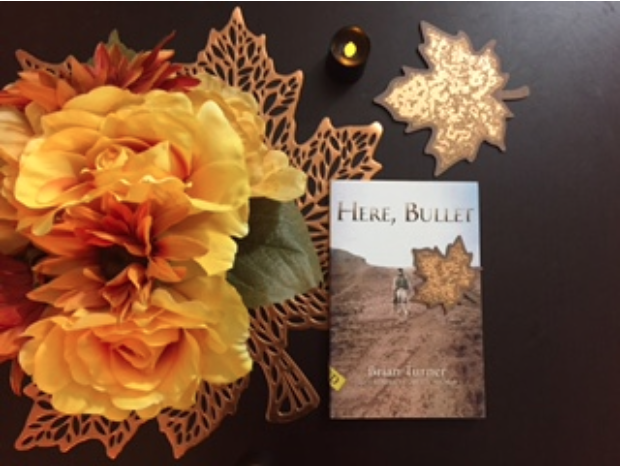By Amy Le ~
With the trees losing their colorful leaves to the cool winds of autumn, do you find yourself struggling to find the right book fitting for this atmosphere? When I think of autumn, I think of the closing of a year. I begin to reflect on what 2017 has brought me and people across the world. Autumn reminds me that just because things have passed does not mean the journey is yet over.
So the next time your mind is itching for something to reflect on, grab yourself the poetry book Here, Bullet by Brian Turner. Turner served in the U.S army for seven years. He served in the Iraq war, which is where he got the inspiration for Here, Bullet in 2003. Turner received his MFA from the University of Oregon and is now a professor at Sierra Nevada College.
Here, Bullet tells Turner’s powerful story of his time in Iraq as an American soldier. He doesn’t filter any of the events he witnesses or his experiences in Iraq, making the poems in the book more emotional and graphic. By the end of the piece, readers can reflect on the devastating consequences of war.
The book is split into four parts, each telling the speaker’s different perspectives during the war.
Introduction of the first section of the book
The book starts off with the poem “A Soldier’s Arabic,” which talks about the repetition of war throughout history. The word for love, habib is the beginning line of the poem and holds a very powerful meaning. As the poem gradually finishes, it talks about how Arabic and habib are now tainted with maut, which means death. It really makes you wonder what can taint such a beautiful word with the dooming of death.
One poem that really makes me see the horrors of war is “Ferris Wheel”. For me, when I think of ferris wheels, I only think of happy memories because that’s what we normally associate them with. They contain good connotations for us; ferris wheels are usually in a place that symbolize the essence of summer, funnel cakes, giggles, and screams of excitement from roller coasters.
So when Turner uses the ferris wheel to open our eyes to another world where ferris wheels do not symbolize joy, but stagnation of death, it hits close to home and allows the readers to understand that innocent people and places are not immune to terrors of war. The ferris wheel in this poem symbolizes a frozen moment in time where it stops on death and smells of rotting flesh. Turner contrasts the devastating differences among ferris wheels in lands where land mines are randomly put in hopes of killing enemies.
The poem “Ashbah” is a great example of Turner’s aesthetic throughout the entire book. It contains a haunting image and eerie atmosphere for soldiers in an unknown land. It begins with the telling of the spirits of American soldiers in Iraq; they die fighting their enemy, but their souls are forever wandering an unknown land– a land where its people, culture, and customs mean nothing to the soldier. A land where they are alone without family.
Turner captures the agonizing emotions of what these soldiers feel since the living cannot hear their pain. “A soulful call reminding them how alone they are,” reminds us readers of all the lost, forgotten dead soldiers fighting for us so that we wouldn’t have to.
The next time the autumn rain is hitting against your window outside, remember to pick up and indulge yourself into Here, Bullet. The book brings the unique perspective of the Iraq war from an American soldier. Turner doesn’t hold back the retelling of his experience and instead chooses to convey the events through carefully thought-out syntax and haunting images.
Once you start, it’ll be hard to put down the book and do anything else. Once you finish, it’ll make you question how severe war consequences are. In the end, who are the real winners?



